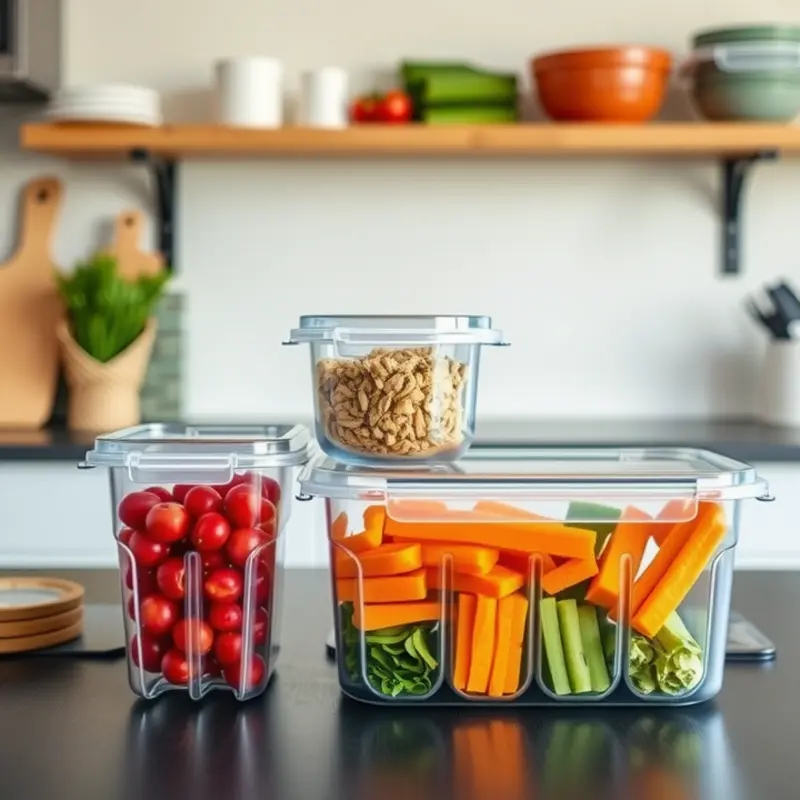Budget-friendly meal prep can be your saving grace in a world where time is scarce, and family meals are essential. By implementing simple planning and prepping strategies, you gain control over your kitchen and create nourishing meals without breaking the bank. Whether you’re cooking for a busy family or just yourself, this guide will provide you with user-friendly tips to streamline your meal routines while saving money.
Mastering the Basics of Meal Planning

Understanding the foundational aspects of meal planning can significantly impact both your budget and time management. To start, identify meals that your family enjoys. This ensures everyone is enthusiastic about meal choices and reduces the chance of meals going uneaten. Once you have a list of favorites, check which ingredients repeatedly appear and assess their cost and availability.
Creating a weekly meal plan is crucial. Begin by taking inventory of your pantry and fridge. Utilize existing ingredients to minimize waste and spending. If you have remaining items, like a half-dug bag of potatoes or leftover rice, incorporate them into upcoming meals. This minimizes waste and promotes a sustainable kitchen environment.
Selecting recipes with overlapping ingredients allows for bulk purchasing, which can reduce costs. For example, if recipes for the week include dishes with onions, carrots, and chicken, buying these items in larger quantities often saves money compared to buying individually. Moreover, when composing your weekly meal plan, consider flexible meals. These meals can adapt to ingredient substitutions based on what’s on sale or in season. For instance, if bell peppers are costly this week, substitute them with zucchinis without significantly altering the dish.
Batch cooking is another effective strategy. Preparing larger quantities of meals at once and then storing them for later consumption can save both time and money. Cooking a large batch of chili for instance, allows for easy reheating on busy nights. This not only saves time but can also prevent the temptation of ordering takeout.
As you develop your meal plan, construct a shopping list based on your chosen meals. Sticking to this list can prevent impulse buys, which often lead to unnecessary expenses. A well-thought-out list ensures that each purchase has a purpose, aligning with your meal plan and budget.
Engage your family in this process. Involving the whole family can transform meal planning into a collective activity, making it an inclusive process where everyone has a say. This can be a fun, bonding activity and ensures everyone feels invested in the meals. Letting children help choose recipes or assist with basic preparations can build their interest in nutritious food choices.
Additionally, mindful ingredient choices can enhance both meal preparation and enjoyment. For ideas on incorporating flexibility into your meal planning, consider reading more on minimal prep dinner ideas. This approach can simplify your prep and incorporate variety into your weekly meals.
Connecting these elements makes meal planning a manageable task rather than a chore, allowing you to enjoy the process and its benefits fully.
Effortless Meal Prepping Techniques

Once your planning is in place, it’s time to dive into meal prepping. Start by setting aside a specific day for preparation—a day when you can focus on chopping, cooking, and storing meals systematically. This approach eliminates daily decision-making, saving valuable time and energy during the week.
Invest in quality containers that meet your needs: stackable to save space, microwave-safe for quick reheats, and label-friendly for easy identification. These features ensure your meals are easy to store, find, and prepare when needed.
Consider preparing versatile ingredients that can be used across multiple meals to maximize efficiency. For example, grilled chicken can seamlessly transition from a salad to a wrap, and even into a hearty stir-fry, catering to varied tastes without additional effort.
Utilizing one-pan recipes is another time-saving hack. These recipes simplify cooking and cleanup, allowing you to focus energy elsewhere. With options ranging from roasted vegetables and meats to complex casseroles, one-pan recipes offer diversity and convenience. Slow cookers also play a pivotal role in this aspect. The slow cooking process allows flavors to develop deeply and requires minimal attention, making them perfect for those with tight schedules.
Freezing is another valuable tool in your meal-prepping arsenal. By freezing portions of the meals you batch-cook, you ensure there’s always a nutritious option available for hectic nights. Portion sizes can be flexible—individual or family-sized—depending on your household’s needs. This approach minimizes waste and guarantees home-cooked goodness even on days where prep time is nonexistent.
Consider visiting this minimal prep dinner ideas guide to boost your arsenal with recipes that require little to no prep work while still delivering on taste and nutrition.
Implement these strategies diligently and watch as the stress of weekday dinners dissipates. Thoughtful meal prep not only makes nutritious meals more accessible but also allows you to reclaim precious time in your day. With these techniques, you can transform the daunting task of meal preparation into a streamlined, efficient part of your routine.
Final words
Implementing these budget-friendly meal prep strategies can significantly alleviate the stress of daily cooking while promoting healthy eating habits. By mastering meal planning and incorporating efficient prepping techniques, you not only save time and money but also create a more enjoyable cooking experience. Remember to stay flexible, adjust your plans as needed, and keep experimenting with new ingredients and recipes to keep mealtime exciting. With a little effort upfront, your future self will thank you, and your family will appreciate the delicious, home-cooked meals.







